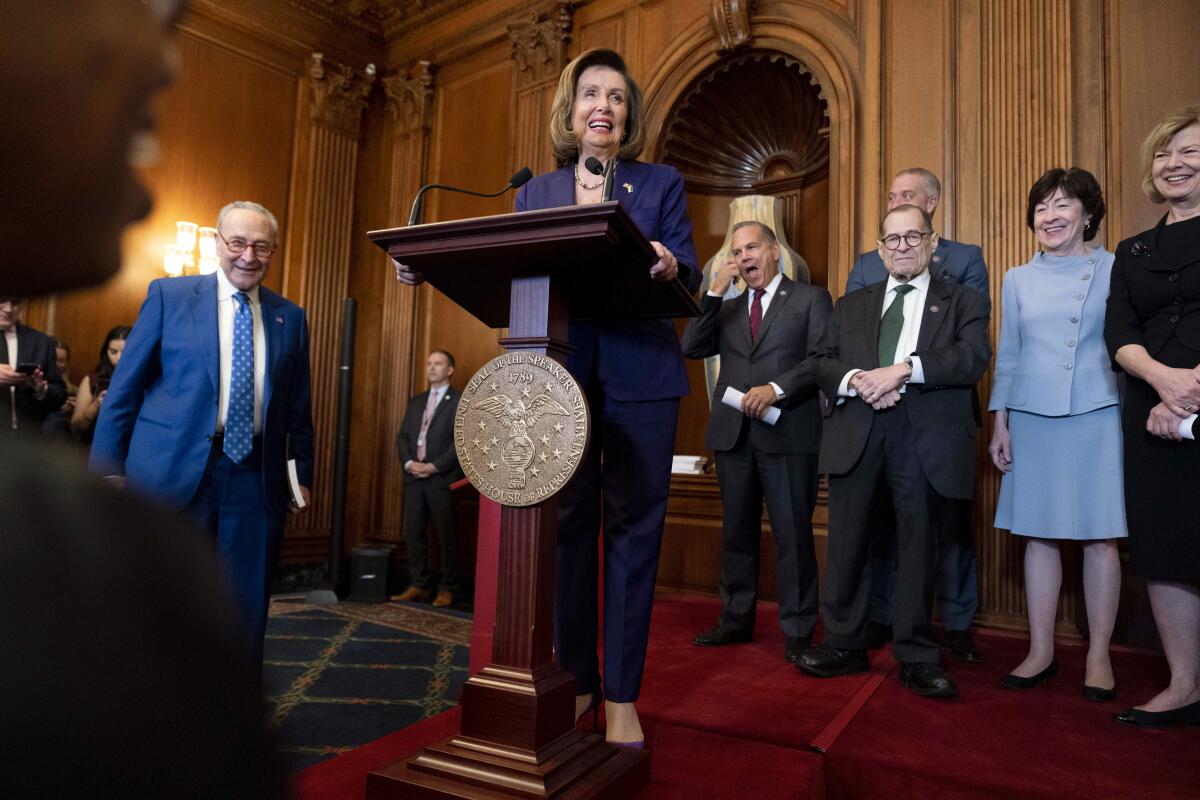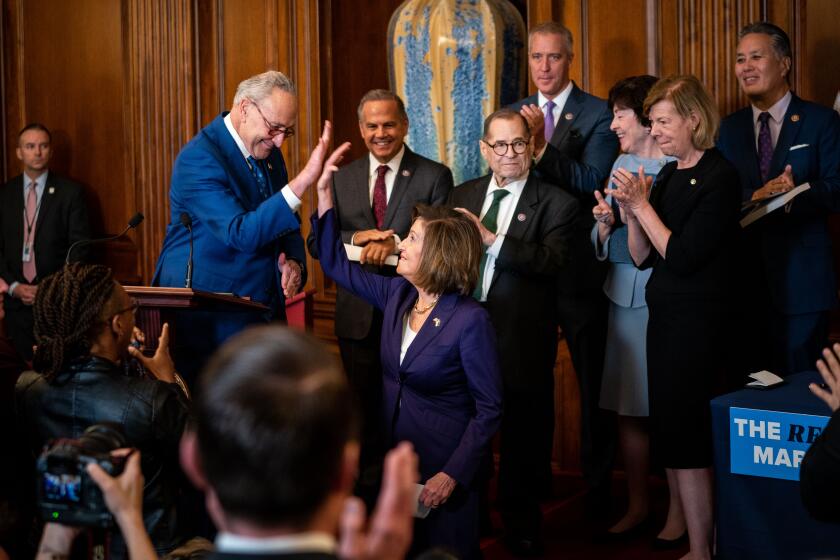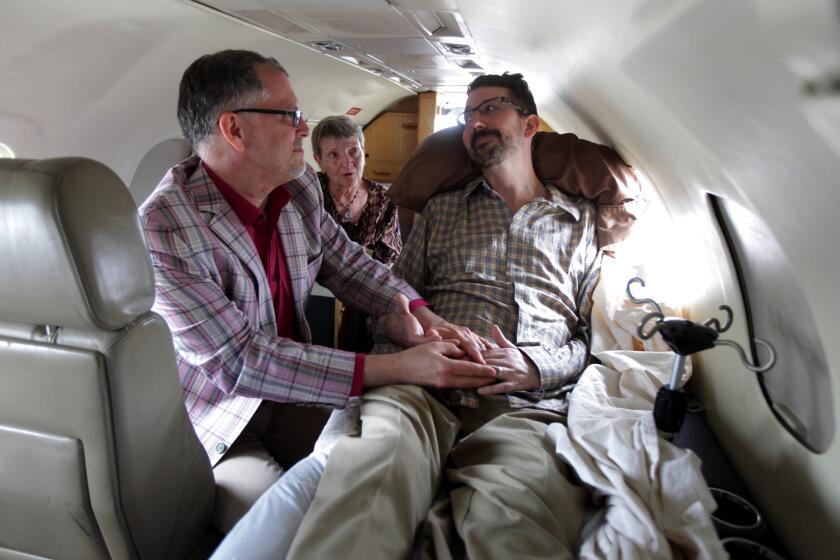How senators ‘defied political gravity’ to protect same-sex marriages

- Share via
WASHINGTON — Wisconsin Sen. Tammy Baldwin was on the Senate floor, but her mind was on the other side of the Capitol.
The House was voting that July afternoon on Democratic legislation to protect same-sex and interracial marriages in the wake of the Supreme Court’s decision to overturn the federal right to an abortion. And it was suddenly winning more Republican votes than Baldwin — or anyone else — had expected.
Baldwin, who became the first out gay senator when she was elected a decade ago, said she was “overjoyed” as she saw the votes coming in. She excitedly walked over to Ohio Sen. Rob Portman, who was also on the Senate floor and had been one of the first Republican senators to come out in favor of same-sex marriage.
“Did you see this?” Baldwin asked, showing Portman a list of Republicans who had voted for the House bill — almost four dozen.
Portman, who had worked with her on the issue in the past, was immediately on board. “Count me in,” he told her.
Along with Sen. Susan Collins (R-Maine), who eventually led the bipartisan effort with Baldwin, the senators teamed up with Sens. Kyrsten Sinema (D-Ariz.) and Thom Tillis (R-N.C.) to try to find the additional Republican votes necessary to get the legislation passed in the Senate.
Thursday’s House passage sends the bill, which requires all states to recognize same-sex and interracial marriages, to President Biden, who’s expected to sign it promptly.
It was a months-long effort, building on a decades-long push, in which they implored their colleagues senator-to-senator. They tweaked the bill to make it more appealing — without changing what it would do — and enlisted key outside allies to help. They convinced skeptical Republicans that it was a personal, not political, effort for the Democrats and that “the sky is not going to fall,” Baldwin said.
Collins, who has a long record of working on gay rights issues, said the GOP support in the House was a turning point. “It suggested we could get the bill through both the House and the Senate and signed before the end of the year,” she said.
In the end, they “defied political gravity,” as Baldwin put it, and passed the Respect for Marriage Act through the Senate. When the final vote was called, they had 12 Republican supporters — two more than they needed to break the filibuster in the 50-50 Senate and pass the bill. The House passed it Thursday and sent the bill to President Biden for his signature.
Along the way, the five senators — Democrats Baldwin and Sinema and Republicans Collins, Portman and Tillis — found that attitudes have changed in the decade since most Republicans were openly campaigning against gay marriage.
Proposal to protect marriage rights highlights divisions within conservative ranks.
Still, most Republicans weren’t inclined to vote for the bill. Supporters had to find at least seven more Republicans to get to yes.
Baldwin, who had advised House lawmakers to keep the bill simple and straightforward, said that “the ink wasn’t even dry on the ledger yet” when she took the list of House supporters and started to talk to senators from those same states.
The five teamed-up senators quickly found that the biggest concern was religious liberty — whether the bill would penalize private institutions or groups that did not want to perform same-sex marriages or provide services to same-sex couples. So they started crafting an amendment to address it.
“As we talked to senators, we found a real openness to the bill but concerns about religious liberty and consciousness protections,” Collins said. She said they started reaching out to some religious groups.
Like LGBTQ people nationwide, I can’t help but worry that the legal logic that might topple Roe will be used against my marriage.
A main concern was that a church or organization could have its tax-exempt status revoked if it didn’t perform a same-sex marriage. “That was a huge issue,” Collins said.
The bill, which requires states to legally recognize same-sex marriages performed in other states, would not have done that. But Collins said the senators “wanted to make sure it was crystal clear” in the amendment.
As the senators organized inside the chamber, groups of influential Republicans organized on the outside. Key to that effort were Ken Mehlman, campaign manager for former President George W. Bush’s 2004 campaign, and a group that he is funding, Centerline.
Focusing on nine states, the group conducted polls, drove local press coverage, organized telephone campaigns and put together more than 70 meetings with senators and staff. The group circulated a list of 430 prominent Republicans and conservatives who supported the legislation, including former senators and Cabinet officials.
Overturning Roe vs. Wade was a big step. But Justice Clarence Thomas would go even further on contraception, gay sex and marriage equality.
Mehlman says the campaign was based on data and polling showing an increasing support for marriage equality. More than two-thirds of the public now supports the unions.
“Center-right voters are supportive of the freedom to marry, and those numbers have increased in recent years,” Mehlman said.
Even as the supporters mobilized, it wasn’t clear if the senators had the votes. Baldwin said that many Republicans she was talking to were skeptical of Democrats’ motivations so close to the midterm elections.
So Baldwin and the other senators met with Senate Majority Leader Charles E. Schumer (D-N.Y.) in mid-September and told him they needed to delay a vote until after the election. It was “disappointing,” she said, and she knew she and Schumer would get pushback from groups that wanted them to force the question on the floor.
Breaking News
Get breaking news, investigations, analysis and more signature journalism from the Los Angeles Times in your inbox.
You may occasionally receive promotional content from the Los Angeles Times.
But she argued that it was the right thing to do, and Schumer agreed. “I’m trusting your counts,” she said he told her.
When the Senate returned after the election, with Democrats having retained their majority, Schumer announced that they would hold an immediate vote on the marriage bill. By then, Baldwin and the others felt more sure of a win — and on Nov. 16, a dozen Republicans voted yes in a key procedural vote to move forward.
After that vote, as the Senate left town for Thanksgiving, some conservative groups mobilized against the bill. On Nov. 23, the Heritage Foundation announced a new $1.3-million ad campaign.
But supporters held firm despite the pressure, and the bill passed the Senate on Nov. 29. As the roll was called, Baldwin teared up, hugging Schumer and others.
The Supreme Court’s decision to overturn Roe vs. Wade is causing some anxiety for people in same-sex marriages, particularly those with children.
“The thing that gets me so choked up is all the times somebody comes up and says this matters to me,” Baldwin said afterward, through tears.
“I’m not surprised that we won that in the courts,” she said. “But protecting it in the legislative body is a big deal.”
More to Read
Get the L.A. Times Politics newsletter
Deeply reported insights into legislation, politics and policy from Sacramento, Washington and beyond. In your inbox three times per week.
You may occasionally receive promotional content from the Los Angeles Times.















